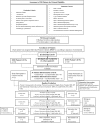A randomized control trial of primary care-based management of type 2 diabetes by a pharmacist in Pakistan
- PMID: 31234840
- PMCID: PMC6591859
- DOI: 10.1186/s12913-019-4274-z
A randomized control trial of primary care-based management of type 2 diabetes by a pharmacist in Pakistan
Abstract
Background: The role of a pharmacist in primary health care settings of Pakistan is still obscure. Thus, we aimed to demonstrate the pharmacist-led improvements in glycemic, blood pressure and lipid controls in type 2 diabetes mellitus (T2DM) patients of Lahore, Pakistan.
Methods: The first open label, randomized control trial conducted at a primary health care facility of Lahore, Pakistan by enrolling 244 uncontrolled type 2 diabetes (hemoglobin A1 c, (HbA1c); 10.85 ± 1.74) patients. The pharmacological intervention included identification of drug related problems, drug interactions, change in dose, frequency and therapy switches in collaboration with physician, while non-pharmacological intervention consisted of diet, lifestyle and behavior counseling. Outcome measures were glycemic (HbA1c), blood pressure and lipid controls.
Results: In intra-group comparison, compared to control arm (C, n = 52), subjects in the intervention arm (I, n = 83) demonstrated significant differences in process outcome measures; baseline vs final, such as HbA1c (C; 10.3 ± 1.3 vs 9.7 ± 1.3, p < 0.001, I; 10.9 ± 1.7 vs 7.7 ± 0.9, p < 0.0001), systolic blood pressure (SBP) (C; 129.9 ± 13.9 vs 136 ± 7.1, p = 0.0001, I; 145 ± 20.4 vs 123.9 ± 9.9 mmHg, p < 0.0001), diastolic blood pressure (DBP) (C; + 4, p = 0.03, I; - 7 mmHg, p < 0.0001), cholesterol (C; 235.8 ± 57.7 vs 220.9 ± 53.2, p = 0.15, I; 224 ± 55.2 vs 153 ± 25.9 mg/dL, p < 0.0001), triglycerides (C; 213.2 ± 86.6 vs 172.4 ± 48.7, p = 0.001, I; 273 ± 119.4 vs 143 ± 31.6 mg/dL, p < 0.0001) and estimated glomerular filtration rate (eGFR) (C; 77.5 ± 18.6 vs 76 ± 14.2, p = 0.5, I; 69.4 ± 21.3 vs 93.8 ± 15.2 ml/min/1.73m2, p < 0.0001). Likewise, inter-group improvements were more significant in the subjects of intervention group at final follow up in comparison to control for various process outcome measures; HbA1c (p < 0.001), SBP (p < 0.0001), DBP (p = 0.02), cholesterol (p < 0.0001), triglycerides (p < 0.0001), SCr (p < 0.001), eGFR (p < 0.001). Moreover, both male and female subjects exhibited similar responses towards intervention with similar improvements in outcome measures.
Conclusion: These data suggested that pharmacist intervention in collaboration with physician in primary health care settings may result in significant improvements in glycemic, blood pressure and lipid controls in Pakistani population.
Trial registration: The trial was registered retrospectively with International Standard Registered Clinical/soCial sTudy Number (ISRCTN) registry on July 26, 2017 under nutritional, metabolic, endocrine category with assigned registration # ISRCTN22657497 and can be assessed at https://doi.org/10.1186/ISRCTN22657497.
Keywords: Blood pressure; Glycemic control; HbA1c; Lahore; Pakistan; Pharmaceutical care; Pharmacist; Randomized control; T2DM.
Conflict of interest statement
The authors declare that they have no competing interests.
Figures
References
-
- Ali I, Khan J, Khan AU. Need of advance clinical pharmacy services: a case study from Pakistan. Arch Pharm Pract. 2015;6(3):64. doi: 10.4103/2045-080X.160992. - DOI
-
- Ali M., Schifano F., Robinson P., Phillips G., Doherty L., Melnick P., Laming L., Sinclair A., Dhillon S. Impact of community pharmacy diabetes monitoring and education programme on diabetes management: a randomized controlled study. Diabetic Medicine. 2012;29(9):e326–e333. doi: 10.1111/j.1464-5491.2012.03725.x. - DOI - PubMed
Publication types
MeSH terms
Substances
Grants and funding
LinkOut - more resources
Full Text Sources
Research Materials
Miscellaneous


